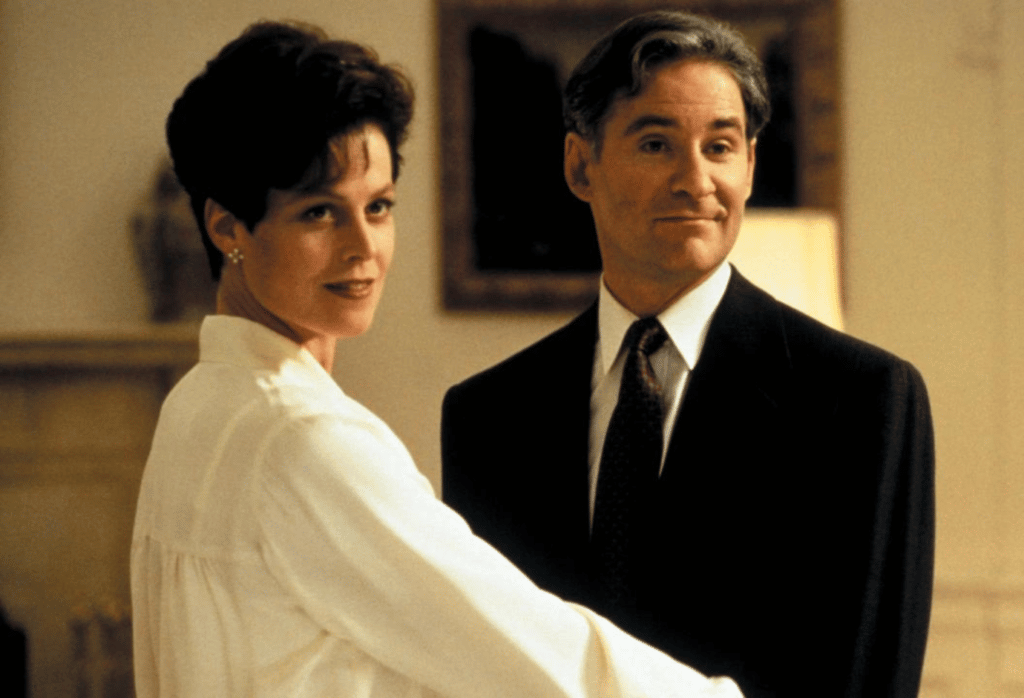‘Dave’ is a movie about a man who is hired to pretend to be the American President. Before he was the sexy Frenchman in “French Kiss” (1995), Kevin Kline was President Bill Mitchell and Dave Kovic in the same film — the former, a strait-laced aplomb of a man, likely based on George H. W Bush; the latter, a kind-natured jovial everyman who works at a temp agency, and genuinely eager to help everyone find jobs.
When the President needs a double to pose as him while he goes off and has some alone time with his mistress (a gloppy and youthful Laura Linney, who is also his secretary) the U.S Secret Service hire Dave to pretend to be the President; duties include waving to the crowd, smiling, and kissing babies.
But then the President has a stroke and enters a coma and Dave needs to stay in the role in a more full-time capacity. This is the comforting, warm Washington political satire that the American people loved in the early 90s.
Just a year before the release of “Dave”, Tim Robbins starred as a Republication folk singer – turned presidential front runner in “Bob Roberts” — and the country collectively blanched at the cynical vision of the film’s core: it would be another twenty-four years until their worst nightmare unraveled, in the form of a reality television billionaire-turned presidential front runner.
It was still years before the world would learn about Monika Lewinsky and Bill Clinton and what they did together.
“Dave” was universally well-received when it was released — it had Kevin Kline as its lead. Kline was the last great actor to successfully pull off the moustache as a convincingly sexy and male (and unproblematic) thing. Nobody in Hollywood has since induced the same lasciviousness and eroticism as Kline did with his moustache (not even Zac Efron).
Kline’s moustache was the dildo for women between 1986-1995. He was one of the biggest stars at this time — he had played a series of impervious and libidinal men— as Otto in “A Fish Called Wanda”, Nick Starkey in “The January Man”, Joey Boca in “I Love You To Death” and Jeffery Anderson in “Soapdish” — all of which have sadly (except Wanda) been mostly forgotten.
“Dave” was a romantic comedy, pretending to be a satirical comedy, though this pretension works on some level — it is at its strongest in the first forty minutes of the film, before we see Sigourney Weaver, who plays The First Lady.
Kline spends the rest of the film cleaning up the real President’s mess and flirting with The First Lady, whose marriage to her husband had gone south long ago.
“Why can’t you die from a stroke like everybody else?” she pleas, deadpan, the first time we (and Dave) meet her.
She doesn’t know that the man in the Oval Office isn’t really her husband anymore— neither does Laura Linney. The comedy comes from watching them trying to figure out what’s going on with this guy. As comedies have historically done — it’s kept information (ie. truth) from women, and we’ve been taught to find humour in their confounding.
Everyone’s sensing some changes in President Mitchell. But only Frank Langella (his chief of staff) and Alan Reed (the White House press secretary) knows the truth. Even his personal bodyguard, a Black man, played by Ving Rhames, doesn’t know he’s not the President. Thank God for Charles Grodin, one of my all time favourite actors, who appears here only in a minor role, as Dave’s friend, an accountant. Grodin’s permanent-look of wincing innocence offsets Langella’s permanent-look of pure evil. The all-star cast is completed by Ben Kingsley who appears in the eleventh hour of the film — as the elusive yet good-hearted Vice President.
Directed by the same man who gave us”Ghostbusters,” “Twins” and “Kindergarten Cop” — Ivan Reitman’s “Dave” is a sort of forgotten classic, like a buried sock you love but have totally forgot about because — it’s a sock.
This film was released in May, 1993. Bill Clinton was five months into his presidency, and four years away from the scandal that would break the world.
“Dave” is a good-natured film with a huge heart. It had hopes for the country and what its people wanted from their man in the office.
A movie like “Dave” would never be made today. But not because it’s dated in its politics, but because it’s dated in its hope. We no longer have the wondrous sense of goodness and optimism we had in 1993. Which is why it is so comforting, and definitely a classic.


